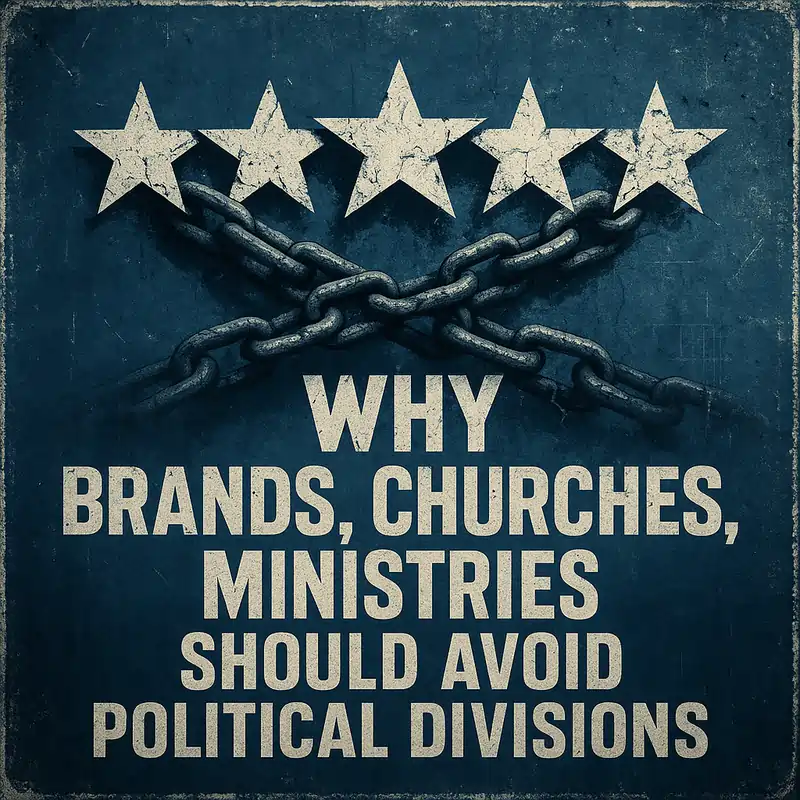 #
#
Why Brands, Churches, Ministries Should Avoid Political Divisions #
Companies and entertainers often become caught up in political and social movements, forgetting what first made them beloved. We have all seen it happen: our favorite brands or actors suddenly stepping into roles as outspoken advocates for polarizing causes, ultimately alienating large segments of their audience. Instead of being a voice of reason, they become yet another source of division, pushing people away rather than drawing them in. It seems increasingly difficult to enjoy entertainment or consumer products without encountering divisive political opinions. This new reality leads to the critical question: Why must the simple pleasures we cherish now come with political strings attached?
Brand Political Backlash #
This dynamic leaves many of us frustrated and disconnected. Products and personalities we once enjoyed now carry a burden of political messaging that conflicts with our personal beliefs and values. Why must watching a movie, using a particular product, or supporting an athlete mean navigating contentious political statements? Fundamentally, companies and celebrities share the simple goal of popularity and profit, yet they frequently adopt positions guaranteed to damage both. Not only do such actions alienate customers, but they also shift the focus from excellence in their craft or product to contentious and polarizing positions.
How Politics Affect Brand Reputation #
As businesses continue to intertwine their brands with social and political issues, their core identity and appeal become diluted. Consumers who previously admired the quality, innovation, or talent of these entities now find themselves facing unwanted choices and complicated allegiances. This phenomenon extends beyond mere frustration; it actively erodes trust and loyalty. When entertainment and consumer choices become politically charged, individuals are left grappling with unintended ethical dilemmas, further complicating their daily lives.
Christ’s Teaching on Politics #
As we consider this trend, let’s reflect on our own actions as ministers and followers of Christ. Could we unknowingly be making the same mistake? Jesus never aligned Himself with political parties or championed political ideologies. His mission was not to endorse worldly policies but to reconcile humanity with the Father, transcending politics entirely in pursuit of spiritual unity. Throughout His earthly ministry, Christ repeatedly demonstrated a distinct separation from political entanglements, focusing instead on teaching principles of compassion, humility, and love.
Therefore, as leaders in the faith community, our call to action must be clear and unwavering: resist the temptation to mix Christ’s message with political agendas. Our pastoral responsibility is to emulate Christ’s example by remaining impartial in worldly disputes, consistently preaching reconciliation, love, and spiritual unity. Just as businesses lose their appeal when they politicize their messages, we risk diluting the power of the Gospel when we tie it to political interests. It is essential for the integrity of our witness and the clarity of our mission that we uphold the separation between our spiritual calling and political activism.
Churches and Ministries Avoiding Political Division #
Let’s renew our commitment to the core of Christ’s calling: being ambassadors of reconciliation, bridging divides, and demonstrating love that surpasses political boundaries. Our mission is clear; to lead the world toward spiritual redemption through Jesus Christ, whose kingdom transcends the politics of this world. By actively distancing our ministries from political affiliations, we create spaces where individuals of all political backgrounds can encounter Christ’s transforming love and experience genuine unity.
Let us stand firm and resolute, ensuring that our voice remains one of spiritual guidance and hope, free from political undertones that might overshadow our true purpose. As we commit to this path, we embody the true nature of Christ’s ministry; one balanced message of unconditional love, unwavering justice, and eternal truth, fostering reconciliation and genuine unity among all people.
This is not a call to ignore our politics or to exclude them from conversations where they are relevant. The truth is that both parties hold moral perspectives they often consider the “standard of correctness.” Rather, it is a call not to limit our reputations or spiritual gifts to political perceptions. It is to ensure the Gospel is heard above all the noise. Evil is evil in and of itself. We do not need to point fingers to recognize it. As Jesus said, “Let the one who is without sin cast the first stone.” (John 8:7). Our task is to focus on the Gospel’s transformative power that transcends partisan divisions and calls all to repentance and grace.




